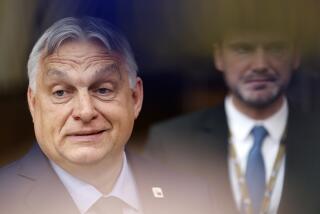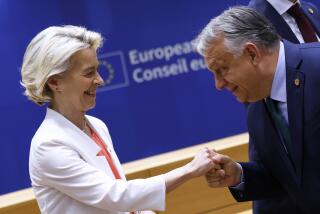Hungarian Reformers Take Over : Veteran Leader Kadar and Many Bureaucrats Out
- Share via
BUDAPEST, Hungary — Janos Kadar, leader of Hungary’s Communist Party since 1956, was replaced Sunday by Premier Karoly Grosz in a sweeping reshuffle that brought outspoken reformers into the ruling elite.
Kadar also left the ruling Politburo and was given the largely ceremonial post of party president, in changes announced at the end of a three-day national party conference.
The 75-year-old revolutionary, increasingly seen as an obstacle to political change demanded by some party members, had been expected to step down as general secretary of the Communist Party.
Politburo member Janos Berecz told a packed news conference that Kadar asked not to be nominated for the party leadership, citing his age and what Berecz termed “the need for renewal.”
The conference also appointed a new, more reform-minded Politburo and approved a policy document, details of which were expected to be announced today.
“This conference marks a radical change,” Grosz told Hungarian Television minutes after being named new party general secretary. “We have faced critically the errors committed earlier.
“A new approach is needed in public life, in production, in human sectors and other fields,” said Grosz, who at 57 is a leader in the mold of Soviet leader Mikhail S. Gorbachev, with a vigorous public manner and a reputation as a pragmatist.
Since becoming premier in June last year, Grosz has imposed austerity measures to try to reduce a net foreign debt of $10.9 billion, deregulate prices and close down money-losing state-owned firms.
Congratulations Cabled
Gorbachev on Sunday cabled his congratulations to Grosz, the official Soviet news agency Tass reported.
Gorbachev wished Grosz success “in tackling the tasks of improving and renovating the socialist society on Hungarian soil,” Tass said.
Asked whether the Soviet Union was consulted about the change of power, Politburo member Berecz told reporters: “Nobody wants to believe that we make sovereign decisions, although we do. We intend to inform our friends of the new appointments, and hope they will be received with support.”
Looking tired, Kadar gave a final speech to the party conference once the new leadership was announced, gracefully thanking retirees for their past work and wishing newcomers success.
“I twice spoke to this party conference and would not like to repeat myself,” Kadar said. “I am convinced that these three days of hard work have been effective.”
With the replacement of Kadar, Bulgaria’s Todor Zhivkov is the last party leader surviving from the 1950s in the Soviet Bloc.
Grosz becomes party leader of a revamped Politburo trimmed of aging bureaucrats and stacked with reformers. Most notable among the liberals were Imre Pozsgay and Reszo Nyers, the father of Hungary’s economic reform in the 1960s who was dropped from the Politburo in 1973.
Pozsgay has called on the government to allow trade unions and political organizations independent of the Communist Party.
The announcement that Kadar was out as party leader was greeted with long, enthusiastic applause by almost 1,000 conference delegates.
‘An Exceptional Day’
“This is an exceptional day for Hungary,” said a prominent party official who supports reform. “We are proud that we have shown that it is possible to do this gracefully. Kadar was a great leader but was clearly no longer competent to hold power.”
Kadar is the first East Bloc party boss to relinquish power after such an open debate on the merits of his leadership.
In December, Czechoslovak party leader Gustav Husak, 75, was replaced by Milos Jakes, a 65-year-old party loyalist. But the switch was made under the cloak of secrecy at a Central Committee meeting.
Kadar took over the party leadership in 1956 after Moscow brought in troops and tanks to quash an anti-Soviet revolt and arrested liberal leader Imre Nagy.
He won popularity at home and abroad by encouraging economic reforms that brought Hungarian consumers prosperity and by tolerating a freedom of discussion rare in the Soviet Bloc in the 1970s.
In a speech Friday, Kadar denounced reformist efforts as threats to single-party rule.
Asks for Support
In a brief interview with Hungarian Television, Grosz asked for the support of Hungary’s 10.6 million citizens and said he will do his best so that the nation gets rid of its pressing problems.
Hungary’s net foreign debt is the largest per capita in the East Bloc. Inflation has touched 18% this year, and more price rises and unemployment are expected as the austerity program Grosz enacted in September takes hold.
Asked about holding two offices, Grosz said he favored the earliest possible separation of his jobs as party head and premier.
In the sweeping upheaval of leading party organs, the Politburo shrank to 11 members from the previous 13.
Eight old members of the Politburo were dropped in the reshuffle. A new 108-member Central Committee replaced the former 106-member body, with about one-third of old members failing to gain reelection to the new body.
More to Read
Sign up for Essential California
The most important California stories and recommendations in your inbox every morning.
You may occasionally receive promotional content from the Los Angeles Times.












